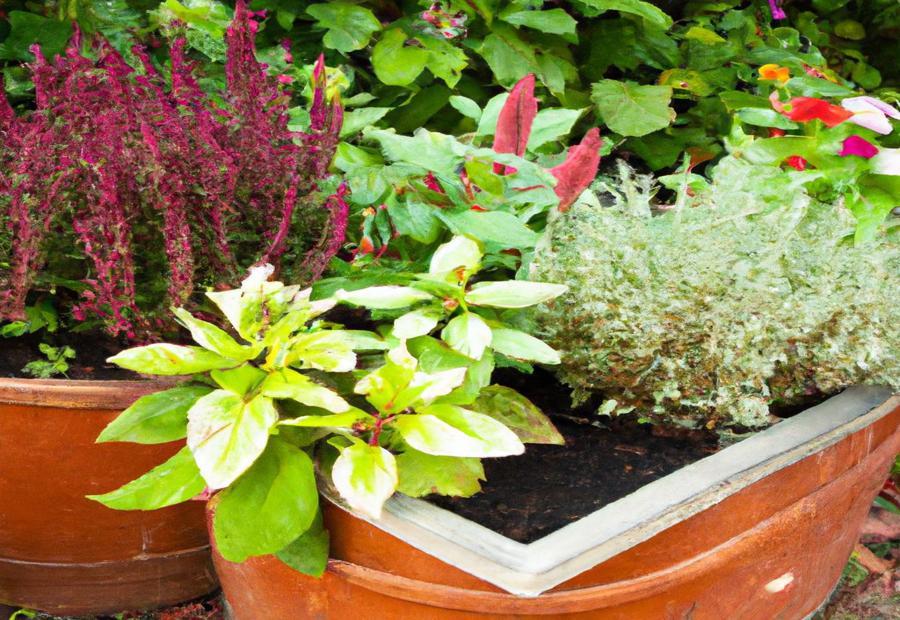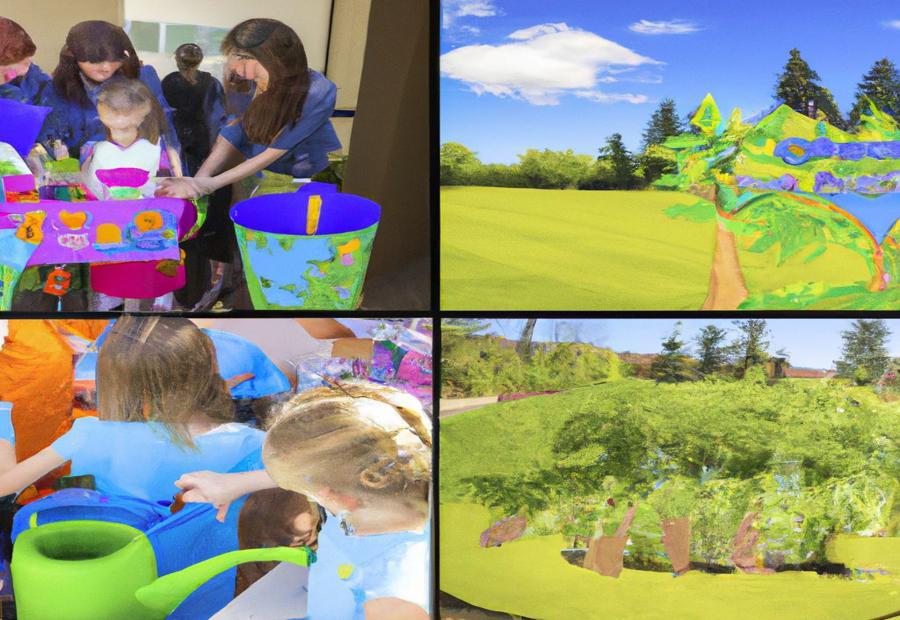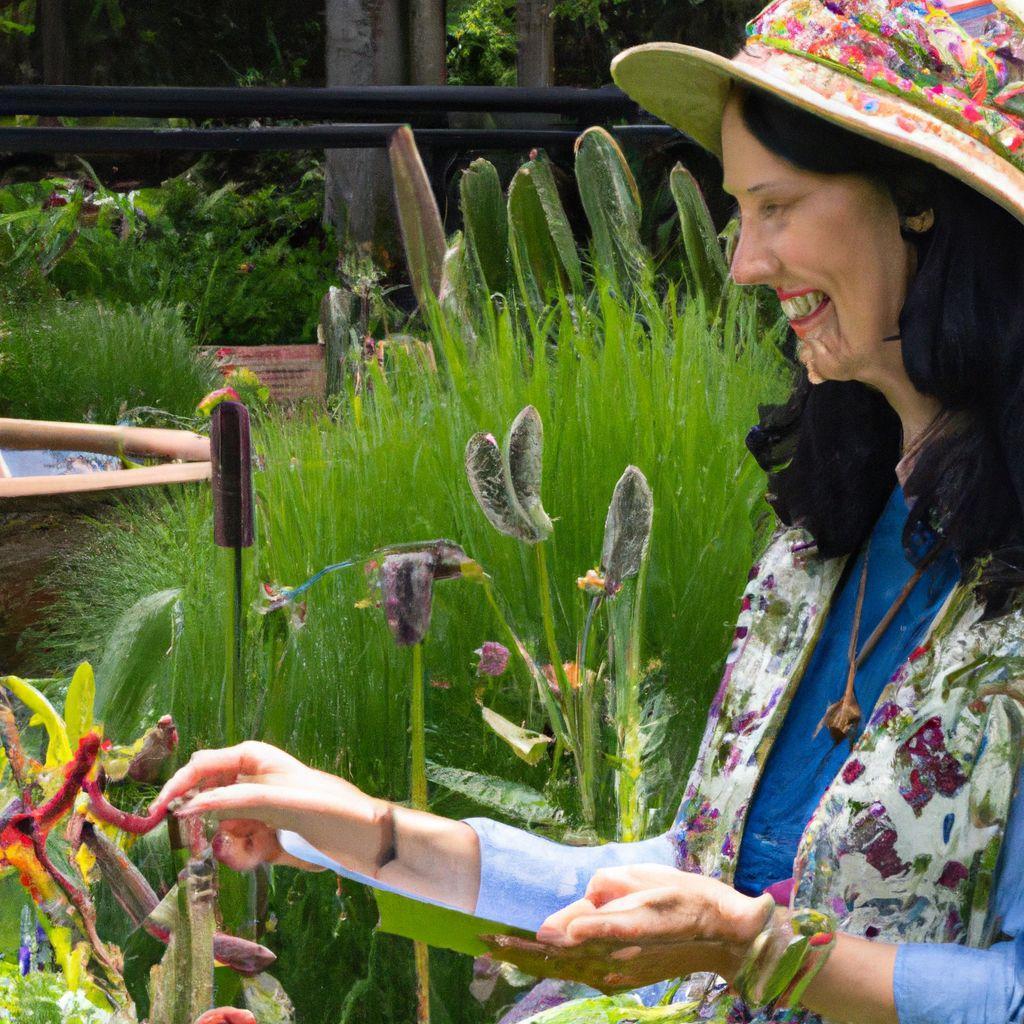Key takeaway:
- Water-Wise Gardening is important: Water-Wise Gardens help conserve water and promote sustainability by utilizing strategies such as plant selection, design techniques, water-efficient irrigation methods, and waste reduction.
- Creating a Water-Wise Garden requires careful planning: Strategies such as selecting drought-tolerant and native plant species, implementing design techniques to reduce water loss and harvest rainwater, and using water-efficient irrigation methods play a crucial role in constructing a successful Water-Wise Garden.
- Educational programs and workshops play a vital role: Hands-on workshops and educational programs on Water-Wise Garden design and maintenance, virtual seminars on low-water landscape design and smart irrigation, and community workshops on water-smart gardening techniques provide valuable information and resources for individuals interested in creating sustainable Water-Wise Gardens.
Introduction

Photo Credits: Gardeninggurus.Org by Gary Hall
Water-Wise Garden Education And Workshops: Dive into the world of water-wise gardening, understanding the significance it holds and the potential benefits it offers. Discover why water-wise gardening is crucial for conserving this valuable resource and explore the advantages it brings to our gardens. Uncover the secrets behind creating thriving gardens while minimizing water usage.
Importance of Water-Wise Gardening
Water-Wise Gardening is essential for sustainable landscapes. It helps conserve water, reducing strain on resources. Plus, it cuts down on chemical fertilizers and pesticides, making the environment healthier for plants and wildlife.
Awareness of water-wise gardening is key. It helps people make smart choices and adopt sustainable habits. These gardens can also be demonstration sites for drought-tolerant and native species. Plus, they provide habitat for pollinators and reduce stormwater runoff.
Educating people is crucial. Workshops provide practical knowledge, and virtual seminars share best practices. One homeowner, inspired by a workshop, transformed their outdoor space into a water-wise garden. With careful plant selection, smart irrigation, and rainwater harvesting, they minimized their dependence on municipal water supplies.
Water-Wise Gardens: A place where plants can survive, and gardeners can find inspiration.
Benefits of Water-Wise Gardens
Water-Wise Gardens provide many advantages and are an essential part of sustainable gardening. They don’t just save water, but also help create a healthier environment. With water-wise techniques and strategies, gardeners can enjoy multiple benefits, such as:
- Reduced water use with efficient irrigation and design.
- Improved plant health and resilience with drought-tolerant, native species.
- Enhanced biodiversity with a variety of plants.
- Minimized maintenance needs thanks to climate-suited plants.
- Lower utility bills due to smart irrigation systems and rainwater harvesting.
Water-Wise Gardens have a huge potential to promote environmental education and awareness. Workshops, seminars, and community programs can teach people about low-water landscape design and irrigation practices. This encourages responsibility and encourages others to adopt water-wise gardening, leading to a more sustainable future.
Creating a Water-Wise Garden: Where conservation meets innovation and your plants thrive!
Strategies for Creating a Water-Wise Garden

Photo Credits: Gardeninggurus.Org by Zachary Wilson
Creating a water-wise garden requires implementing effective strategies. Discover how to choose drought-tolerant plants, reduce water loss through design techniques, utilize water-efficient irrigation methods, and incorporate waste reduction practices in water-wise gardening.
Plant Selection for Drought-Tolerant and Native Species
Gardeners know the value of selecting drought-resistant and indigenous plant species when making a water-wise garden. By picking plants that can handle dryness and fit the local climate, gardeners can reduce the water needed for their gardens yet still have a gorgeous landscape.
- Drought-Resistant Species: A major point in water-wise gardening is to pick plants that have adapted to need less water. These drought-resistant species have long root systems or waxy leaves to keep moisture. By using these plants, water loss is reduced and the need for frequent watering is lowered.
- Native Species: Native plants are suitable for the local environment because they have been created to live in certain climates. By choosing native species, gardeners help preserve biodiversity and make sure the plants only need natural rainfall. This decreases dependence on irrigation systems and helps our planet.
- Advantages of Plant Selection: Selecting drought-resistant and native species has several benefits. 1. It saves water by needing less irrigation. 2. These plants are usually stronger against pests and illnesses and need fewer chemicals. Lastly, they generate habitats for native wildlife and support ecological balance in the garden.
Moreover, by promoting biodiversity through plant selection, gardeners can create a beautiful landscape that can handle changing weather and stay strong in dry times. Therefore, understanding the significance of plant selection for drought-resistant and native species is important for having a sustainable and water-efficient garden design.
Design Techniques to Reduce Water Loss and Harvest Rainwater
To efficiently use water in gardening, design techniques to reduce water loss and harvest rainwater are essential. These can make a big difference in creating a water-wise garden!
- Choose drought-tolerant and native plants to minimize water loss and keep your garden healthy.
- Organize plants with similar water needs together to prevent evaporation and runoff.
- Use mulching to prevent soil moisture evaporation and weed growth.
- Optimize irrigation systems with drip irrigation or smart sprinkler systems to avoid water wastage.
- Install permeable surfaces or rain gardens to capture rainwater and replenish groundwater.
- Harvest rainwater with rain barrels or cisterns to recycle rainfall for later use.
These design techniques are key to reducing water loss and making resources more available in the garden. By planning carefully and using sustainable practices, you can create a landscape that doesn’t need a lot of water.
Plus, these techniques boost biodiversity and help mitigate drought conditions. Embrace them for an aesthetically pleasing, environmentally friendly garden that contributes to a sustainable future.
Don’t let your plants suffer – explore water-efficient irrigation methods and techniques to give them the hydration they need!
Water-Efficient Irrigation Methods and Techniques
Water-efficient irrigation is key for a sustainable garden. One way to do this is with drip irrigation systems. These deliver water straight to roots, ensuring plants get only what they need and no more.
Smart controllers are also helpful. They adjust watering schedules based on weather and soil moisture levels, avoiding overwatering.
Rainwater harvesting is beneficial, too. Collecting rainwater in barrels or cisterns allows for later use in watering plants. This lowers reliance on traditional water sources and minimizes water consumption.
Efficient irrigation zoning is a great design tool. Create zones based on different plant needs and target watering accordingly. This prevents overwatering and saves water.
Other strategies include using native and drought-tolerant plants and techniques like mulching and composting. Composting organic waste improves soil moisture retention and garden health.
By implementing water-efficient methods, individuals can minimize wastage and ensure adequate hydration for their plants. This creates an environmentally friendly garden that will thank you for conserving water resources.
Composting and Waste Reduction in Water-Wise Gardening
Composting and waste reduction are essential to water-wise gardening. These practices help manage organic waste, reduce the need for water and promote sustainability. Composting transforms kitchen scraps and yard waste into nutrient-rich compost that can act as natural fertilizer. Waste reduction techniques, such as mulching and reusing materials, also aid water conservation and environmental sustainability.
By practicing composting and waste reduction, several benefits are gained. Soil moisture is retained better, reducing the need for watering. Compost provides essential nutrients, lessening the need for synthetic fertilizers. Waste reduction reduces landfill waste and greenhouse gas emissions.
To further enhance these practices, educational programs and workshops should be implemented. These initiatives educate individuals on the importance of composting and its connection to water conservation. Participants learn techniques, such as achieving a balanced carbon-nitrogen ratio in compost piles, managing organic materials, and troubleshooting issues. Hands-on activities, such as constructing compost bins and conducting waste audits, can be done as well.
In summary, composting and waste reduction are necessary to water-wise gardening. They help enhance sustainability, conserve water and improve garden health. Educational programs and workshops ensure individuals have the knowledge and skills to effectively implement these practices.
Hands-On Workshops and Educational Programs

Photo Credits: Gardeninggurus.Org by Paul King
Hands-On Workshops and Educational Programs offer a range of engaging opportunities for individuals to learn about water-wise garden practices. From workshops on garden design and maintenance, virtual seminars on low-water landscape design and smart irrigation, to community-based workshops on water-smart gardening techniques, these programs cater to diverse interests and skill levels. With expert guidance and interactive sessions, participants can gain valuable knowledge and skills to create beautiful, sustainable gardens while conserving water resources.
Workshop on Water-Wise Garden Design and Maintenance
This Workshop on Water-Wise Garden Design and Maintenance will provide education and hands-on experience to those looking to create sustainable gardens. Learn about drought-tolerant and native plants, design techniques such as mulch and permeable surfaces, and rainwater harvesting systems. Gain knowledge on irrigation methods that minimize water wastage, such as drip irrigation or timed sprinkler systems. Discover the importance of composting and how it reduces waste and improves soil health.
Throughout the workshop, attend hands-on activities and demonstrations to enhance learning. Connect with experts in the field, access valuable resources, and gain educational materials. Acquire practical skills, share experiences with others, and contribute to sustainability.
This comprehensive program equips participants with the necessary knowledge and skills to create environmentally friendly gardens that conserve water efficiently. Suitable for experienced gardeners and beginners alike, don’t miss out on this opportunity to learn from experts and make a positive impact in water conservation efforts through your garden.
Virtual Seminars on Low-Water Landscape Design and Smart Irrigation
Online educational programs on low-water landscape design and smart irrigation offer valuable info on creating gardens that need minimal water. These virtual seminars include:
- Choosing drought-tolerant plants
- Implementing efficient irrigation methods
- Incorporating rainwater harvesting techniques
Individuals can access these seminars from anywhere with an internet connection. They provide interactive presentations, videos and Q&A sessions. Practical tips and step-by-step instructions help attendees apply the knowledge for residential or commercial settings. Participants can engage with industry experts and ask questions related to their gardening needs.
Hands-on workshops also allow people to apply what they learned. They can design a water-wise garden or install a water-efficient irrigation system. This helps further enhance their understanding of water-wise gardening techniques.
Recent years have seen an increase in popularity of virtual seminars due to their convenience and accessibility. This is according to WaterSmart Innovations Conference Proceedings (2011).
Benefits and Reviews of Waterwise Yard Seminars
Waterwise yard seminars have earned positive reviews from participants, offering many advantages. These educational programs provide insights and practical knowledge for creating and managing water-wise gardens.
- Attendees gain insight into water-efficient gardening principles and strategies. This helps them to decide on plant selection, design techniques, and irrigation methods.
- These seminars also permit participants to swap ideas and success stories. This exchange of information builds a sense of community and encourages sustainable gardening.
- By attending, folks can master designing and maintaining water-wise landscapes, improving their yards and conserving water.
- The glowing reviews from past participants prove the effectiveness of these seminars in changing behavior towards more eco-friendly gardening habits. People appreciate the tips and advice from experts, as well as the workshops’ interactive nature.
Apart from these benefits, note that waterwise yard seminars are accessible opportunities for people to learn and contribute to environmental conservation.
Pro Tip: Attend several waterwise yard seminars to gain a thorough understanding of various elements of creating an eco-friendly garden.
Community Workshops on Water-Smart Gardening Techniques
Attendees of community workshops on water-smart gardening techniques gain insight into choosing drought-tolerant and native plants. They learn design strategies, such as mulching and shading, to reduce water loss. Also, efficient irrigation methods like drip irrigation and smart sprinkler systems are discussed to limit water waste. Composting and waste reduction practices are essential for a water-wise garden. Participants learn how to recycle organic materials, reducing watering needs and keeping soil quality high. Attendees have the chance to gain knowledge and skills needed to establish sustainable gardens that save water while maintaining beautiful landscapes.
Conclusion

Photo Credits: Gardeninggurus.Org by Sean Hill
In the conclusion, we will discuss how to take action for a sustainable water-wise garden, offering practical tips and insights to help you implement water-wise practices.
Taking Action for a Sustainable Water-Wise Garden
To make a water-wise garden that’s sustainable, you must take action. Follow these 4 tips and you’ll have a garden that conserves water and lasts for years!
- Plant Selection: Pick drought-tolerant and local species. These plants know the local climate and need little water.
- Design Techniques: Use mulch and rain barrels to retain moisture. Set up targeted drip irrigation systems and cisterns to collect rainwater.
- Water-Efficient Irrigation: Install low-flow sprinklers or drip irrigation. These methods help water reach plant roots with little evaporation.
- Waste Reduction: Compost organic materials. Reduce the need for chemical fertilizers by recycling gardening materials.
Take action now and turn your outdoor space into a sustainable oasis! Join others who already benefit from a water-wise garden. Don’t miss out on this movement for environmental sustainability in gardening.
Some Facts About Water-Wise Garden Education And Workshops:
- ✅ Water-Wise Garden Education And Workshops aim to teach participants about creating sustainable gardens with low water and maintenance needs. (Source: Trades Applied Tech)
- ✅ These workshops cover topics such as plant selection, design strategies, water efficient watering techniques, and composting. (Source: Green Living Workshop)
- ✅ Water-Wise Garden Education And Workshops offer hands-on demonstrations on building wicking beds and ollas for water conservation. (Source: Resource Central)
- ✅ These workshops are conducted by local landscape and horticultural professionals, providing valuable insights for both novice and advanced gardeners. (Source: Resource Central)
- ✅ Participants in Water-Wise Garden Education And Workshops learn how to reduce water usage, support wildlife, and create sustainable gardens. (Source: SGA Online)
FAQs about Water-Wise Garden Education And Workshops
FAQ 1: What is a water-wise garden and how can I manage water effectively in my garden?
A water-wise garden is designed to minimize water usage and maintenance inputs while still creating an aesthetically pleasing and productive garden. You can manage water effectively in your garden by implementing smart design options and choices, such as utilizing garden zones and selecting indigenous and drought-tolerant plants that thrive in dry climates. Additionally, techniques like harvesting water on site, storing water in the soil, and using water-efficient watering techniques can help reduce water consumption in your garden.
FAQ 2: What are wicking beds and how can they be used in a water-wise garden?
Wicking beds are a type of gardening system that can be utilized in a water-wise garden. These beds have a water reservoir at the base, which slowly releases water upwards through capillary action to the plant roots, ensuring efficient water use. They are particularly useful in areas with sporadic deluges or limited water supply, as they help maintain moisture levels in the soil and minimize water wastage.
FAQ 3: How can I incorporate indigenous plants into my water-wise garden?
Incorporating indigenous plants into your water-wise garden is a great way to ensure water resilience and support local ecosystems. Indigenous plants are adapted to the local climate and require less water and maintenance inputs compared to exotic plants. By choosing indigenous plants, you can create a garden that is not only water-conserving but also supports biodiversity and provides habitat for local fauna.
FAQ 4: How do garden zones and smart design options contribute to water-wise gardening?
Garden zones and smart design options play a crucial role in water-wise gardening. By dividing your garden into zones based on water needs and microclimates, you can efficiently allocate water resources. Additionally, smart design options like using mulch, creating in-ground irrigation systems, and incorporating water-holding features such as swales can further minimize water loss and ensure optimal water distribution within the garden.
FAQ 5: Can novice gardeners benefit from water-wise garden education and workshops?
Absolutely! Water-wise garden education and workshops are designed to cater to both novice and advanced gardeners. These educational programs provide practical tricks, techniques, and strategies for effectively managing water in your garden. Whether you’re a beginner or an experienced gardener, attending these workshops can enhance your gardening knowledge and help you reduce water usage while maintaining a beautiful and sustainable garden.
FAQ 6: How can water-wise gardening contribute to reducing waste and adapting to climate changes?
Water-wise gardening approaches, such as choosing drought-tolerant plants, implementing water-efficient watering techniques, and using mulch and other conservation practices, can significantly reduce water usage. By conserving water in our gardens, we minimize water waste and contribute to efforts in reducing overall water consumption. Additionally, water-wise gardening also helps us adapt to climate changes by creating more resilient and sustainable landscapes that can withstand fluctuations in water availability.


